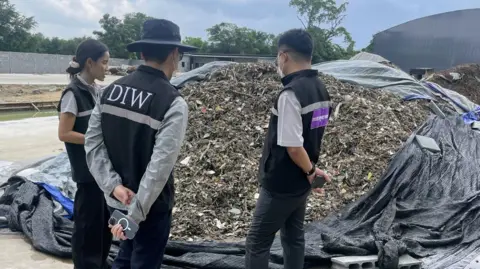The growing concern of electronic waste, particularly from obsolete mobile phones, has become an alarming environmental issue in Thailand. The crisis stems from outdated mobile devices and other electronic appliances that are improperly disposed of, contributing significantly to the pollution problem in the area. As technology evolves rapidly, consumers frequently upgrade their gadgets, leading to a surge in e-waste. This has created a challenge for authorities aiming to manage the ecological impacts associated with abandoned electronics.
In Eastern Thailand, Thitipas Choddaechachainun, a head inspector from the Ministry of Industry, has been at the forefront of this struggle. Working alongside a dedicated team, she analyzes heaps of scrap metal and circuit boards scattered throughout unlicensed recycling facilities. These operations proliferate in rural regions, often hidden from government regulation. Ms. Choddaechachainun’s team regularly conducts raids to sample waste materials and identify violations of licensing laws. Despite their diligent efforts, the issue continues to intensify, suggesting systemic challenges in regulating illegal recycling activities.
The core of this e-waste crisis can be traced back to shifts in global policies regarding the shipment of hazardous materials. Historically, countries like China were the principal destinations for exported electronic waste. However, in 2018, China enacted an import ban on foreign e-waste, drastically shifting the flow of toxic materials to nations like Thailand. Since implementing a prohibition against importing e-waste in 2020, the Thai government has struggled to mitigate increasing volumes, which reportedly expanded twentyfold within the last decade. Presently, Thailand confronts an influx of over 60,000 tonnes of e-waste annually, mainly sourced from the United States and the European Union.
This scenario is exacerbated by mislabeling practices where e-waste is packaged as “second-hand goods for resale” to circumvent legislation prohibiting hazardous waste shipments. Once in Thailand, the discarded items enter unlicensed recycling operations, where they are violently processed through shredders and toxic smelters. This malpractices generate emissions of harmful substances like mercury and lead, creating severe environmental challenges that threaten both public health and local ecosystems.
Local farmers bear the brunt of these illegal activities. As exemplified by farmer Seng Wongsena, who observes that toxic runoff from nearby smelting operations is contaminating his crops. He reports that the pollution has directly impacted his cassava harvest, revealing a direct link between illicit recycling practices and agricultural degradation. The pervasive smell and contamination disrupt not only his livelihood but also the health of the local community. Efforts by environmental activists to shut down harmful operations are met with resistance, revealing a complex web of economic and environmental interests at play.
In response to this growing crisis, Industry Minister Akanat Promphan has recognized the urgency of addressing e-waste issue in Thailand. He emphasized the lack of economic benefit derived from the unregulated recycling sector and the associated environmental harm it causes. Promphan is leading an initiative to establish stricter regulatory frameworks to dismantle illegal recycling businesses, many of which are reported to be foreign-owned and profit-driven.
Globally, the surge in electrical and electronic waste is alarming, with the United Nations estimating over 60 million tonnes produced each year, equating to a significant increase from previous statistics. Of this amount, less than 25% is effectively collected and processed in an environmentally responsible manner. Promphan hopes upcoming legislation will encourage major electronics manufacturers to be accountable for managing their products from production to disposal, potentially alleviating some challenges faced in the recycling ecosystem.
The issue of e-waste in Thailand is emblematic of a vastly intricate global challenge regarding electronic waste management. The fight against pollution from mobile phones and other electronics not only reflects local regulatory inadequacies but also the need for international cooperation to reform waste management practices in an age of rapid technological advancement. Future resolutions will require comprehensive action and collaboration between governments, businesses, and educational institutions to develop sustainable solutions and mitigate the effects of e-waste on both the environment and public health.











